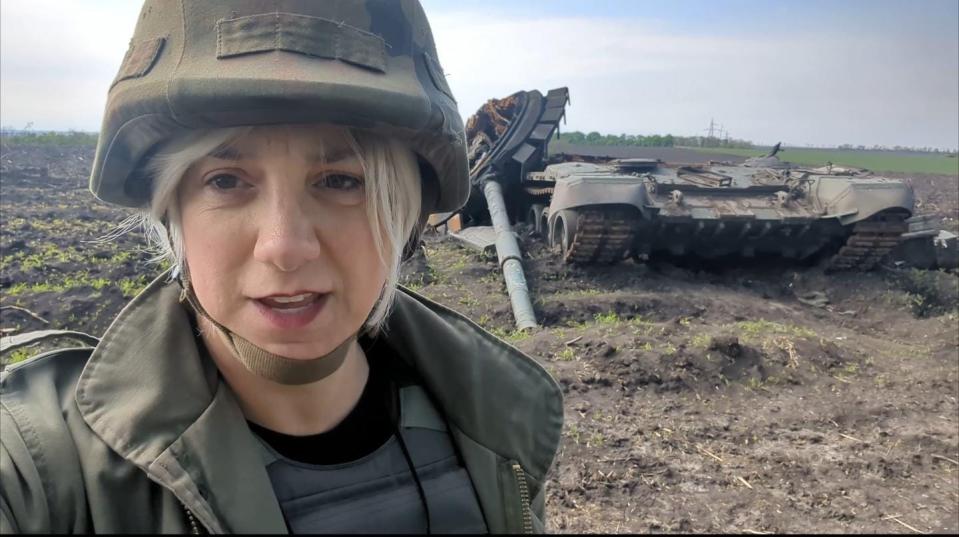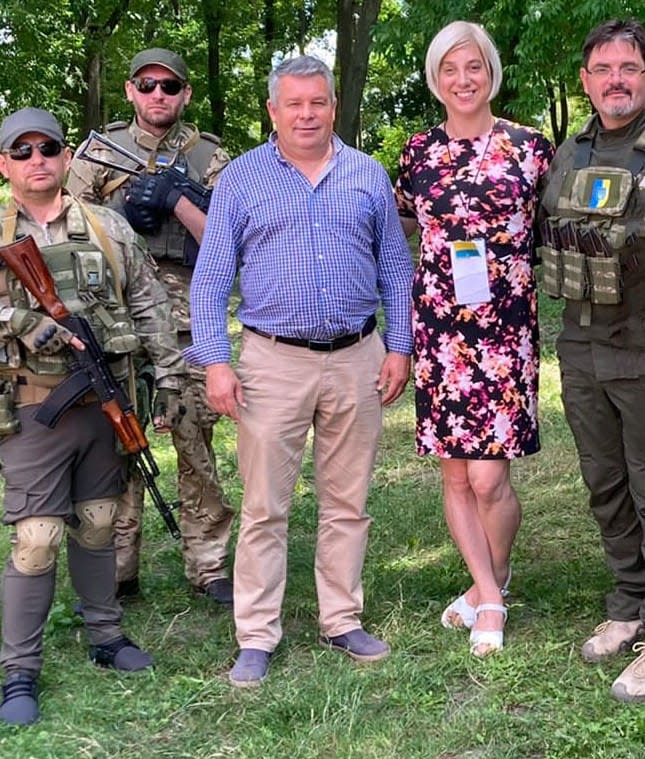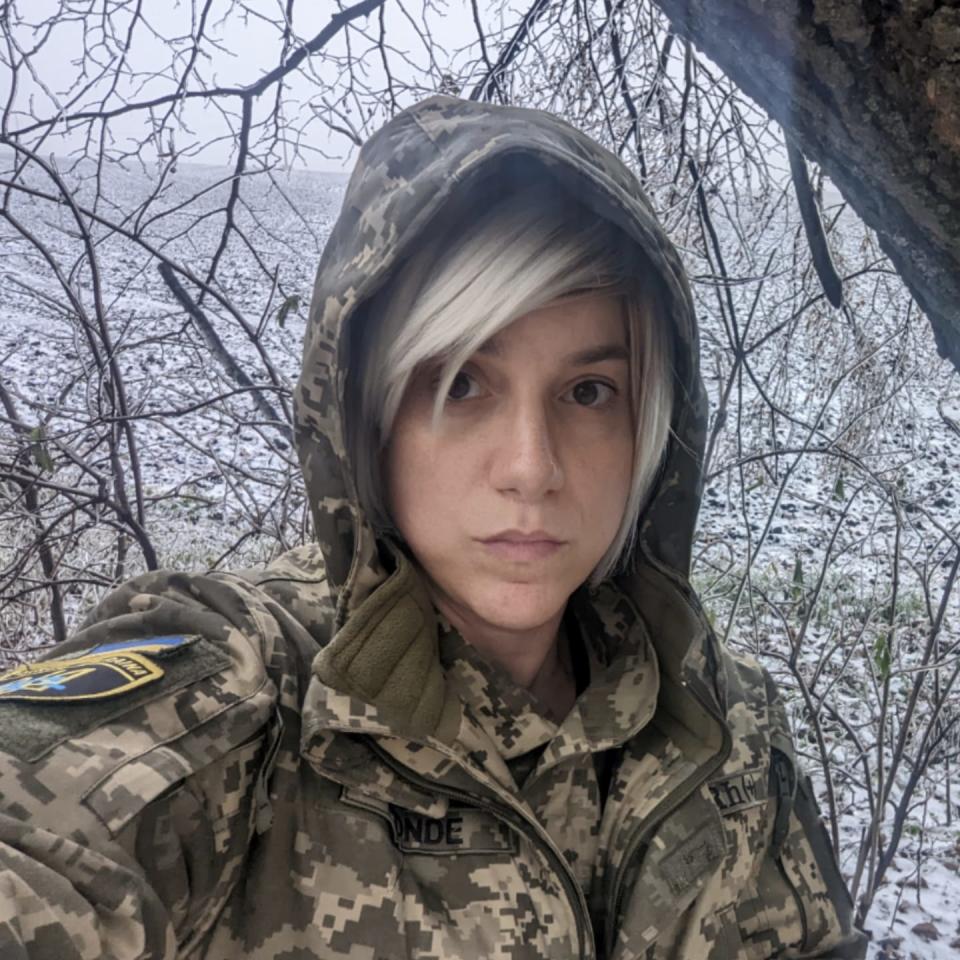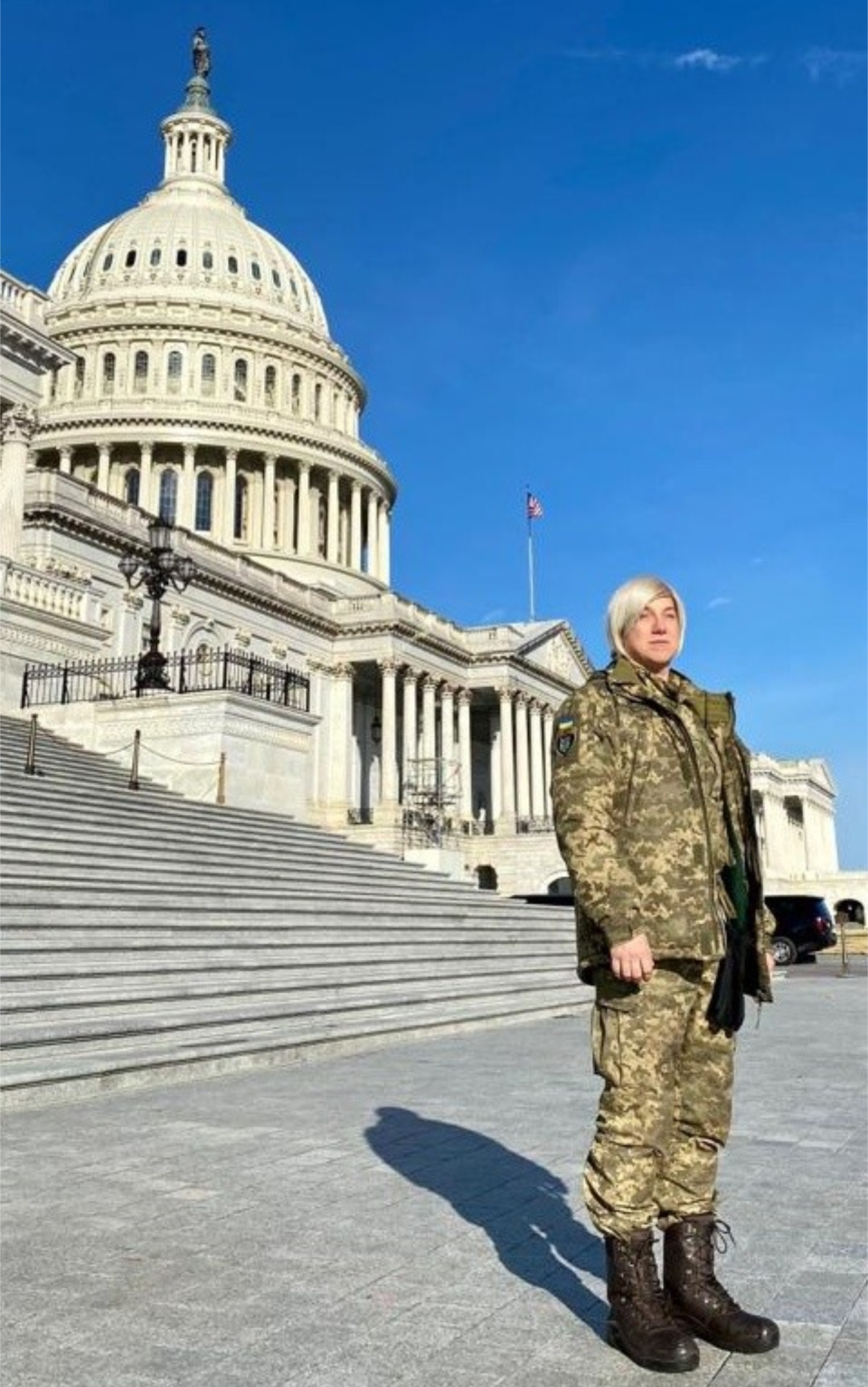'Crazy shift in my perception': How first transgender war correspondent is now fighting with Ukraine
On a summer day in Zolochiv, Ukraine, a rocket dropped from the sky and exploded into a building across the street from journalist Sarah Ashton-Cirillo, who caught the blast on cellphone video. The artillery, one of many seen in the country for weeks, didn't just crater the sidewalk.
It also led Ashton-Cirillo – the world's first openly transgender war correspondent – to be hit with a new perspective.
"There was this crazy shift in my perception of where my place was in the war," she said. "My mind had undergone a metamorphosis because it was not anymore me covering the war, I was basically living the war. ... I had become very conflicted regarding my feelings as to where I belonged."
In Ukraine she had seen bodies of injured or killed civilians, moved food supplies for the military effort and befriended many a servicemember, all of which caused her to reflect on her work and eventually turn from photographing and writing about gunfire to being a part of it.
Now a member of the Ukrainian armed forces, first as a combat medic and now focusing on hybrid warfare, the 45-year-old Las Vegas native is unshakable in the cause for Ukrainian freedom.
"If I knew now what I knew nine months ago, I'm not certain I would have chosen this path," she said. "But because I did choose this path, the only way to go is forward, focused on mission, focused on my convictions and values as to why I'm doing this."

A story of pivotal moments
Ashton-Cirillo had covered the consequences of war before, reporting from the Syria-Turkey border on the refugee crisis during the country's civil war in 2015. With hesitation but no regret, she moved forward into the war zone in Ukraine.
"When I went ahead and saw that the invasion had happened, I basically thought to myself: Am I really going to do this?" she said.
Even before entering Ukraine, Ashton-Cirillo faced expected obstacles getting into the country as a transgender woman. She intentionally flew into Berlin on her origin flight with an awareness that the city might be more progressive about her gender identity not matching the photo and details on her passport. At the Ukrainian border, she brought press clippings to prove her identity, fearful of being barred from the country.
But in less than an hour, she heard all she needed: "Welcome to Ukraine."
'I was basically living the war'
Initially without a combat helmet, a chest protector or press plates, she made a spur-of-the-moment decision to enter the city of Kharkiv, further into a dangerous area of the war zone. Ashton-Cirillo said that at the time, the risks of her decision weren't something she could process, but she now knows the choice was pivotal for her future.
In Kharkiv and later Zolochiv, she witnessed bombings and rockets cratering buildings, hid in bomb shelters with Ukrainians, and shared photos, videos and dispatches of it all on her Twitter account.
Working as a freelancer for LGBTQ Nation, she largely focused on the effect of the war on LGBTQ Ukrainians, including Russian military forces targeting LGBTQ civilians in Ukraine and the expression of LGBTQ acceptance among Ukrainians through the arts.

She grew closer with members of the Ukrainian forces and served as an army volunteer to deliver food supplies. In Zolochiv, the village's mayor even appointed her an official outreach coordinator so she could advocate for aid to its citizens.
How war gave Ashton-Cirillo a changed perspective
The gradual shift in Ashton-Cirillo's place in the war, from the professional to the personal, led her to consider what steps would be required for her to join the Ukrainian military. By August, Ashton-Cirillo was working so closely with the Armed Forces of Ukraine, she stopped reporting for LGBTQ Nation to avoid a conflict of interest.
She began to write policy papers and analysis for units of the Ukrainian government, all the while considering how she could become more involved in the war effort.
Il'ko Bozhko, former press officer for the Operation Command East for Ukraine and close friend of Ashton-Cirillo, said he shared his own experience and motivations behind joining the armed forces with her as she made the decision and went with her to formally apply to serve.
"We had many conversations about it. It wasn't a spur-of-the-moment decision for her," Bozhko said.
She enlisted with the armed forces in October.

'The whole gender thing'
In her time as a reporter and now as a servicemember, Ashton-Cirillo says, she experienced next to no pushback to her gender identity from Ukrainians, whose country has made slow but gradual progress in LGBTQ inclusivity.
The country, like many in Eastern Europe, has a long history of oppression of sexuality and expansive gender expression. But in recent years it has become somewhat of a haven for those seeking gay nightlife and a marginally more accepting environment. Being LGBTQ is legal in Ukraine, but same-sex marriage is not.
Ashton-Cirillo said she has seen progress in LGBTQ acceptance in the country because of the equity created by war and doesn't believe it will be reversed.
As for how being transgender comes into play for her in her unit on a daily basis, Ashton-Cirillo called her gender identity a "non-issue" for those around her in Ukraine.
"It didn't register as any big deal that I'm a trans soldier and in Ukraine," she said. "It turned out to be the easiest part of my time there. ... You are judged on your character, you are judged on your courage, and you are judged on your belief in freedom and your loyalty to Ukraine. I mean, nothing else matters."

A unexpected role: Liaison between the US and Ukraine
Initially, Ashton-Cirillo also didn't fully grasp the informal role she'd be playing as a sort of liaison between the U.S. and the Ukrainian Armed Forces because of her enlistment.
When returning to the U.S. for the first time in December, she made two trips to Capitol Hill to speak with more than a dozen legislative offices, including members of the Commission on Security and Cooperation in Europe, also known as the U.S. Helsinki Commission.
Politicians regardless of party or perspective on the LGBTQ community have trusted her to deliver an unvarnished message from the other side, she said.
"Where we are right now, in this moment, the Ukrainian government entrusted an American soldier to represent them in Washington, D.C., in the middle of a war," she said. "And oh, yeah, she's transgender."
Ashton-Cirillo hasn't entirely abandoned writing. She is writing about her perspective on the war as a contributing columnist for media website Resolute Square.
After the war, Ashton-Cirillo hopes to work on veterans rights in the U.S. or elsewhere with her knowledge of the challenges of reintegrating into life after a war zone.
"It's easier to fight a world war against Russia as a transgender female than it used to be in the United States, trying to have to live a life where my gender identity is the No. 1 thing that comes up no matter what."
This article originally appeared on USA TODAY: First transgender war journalist now fighting with Ukraine vs. Russia


